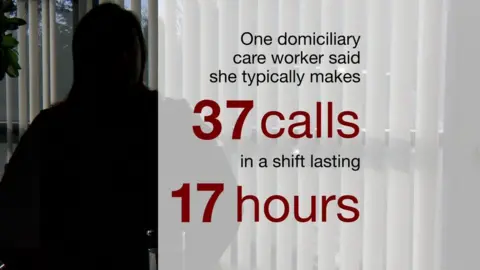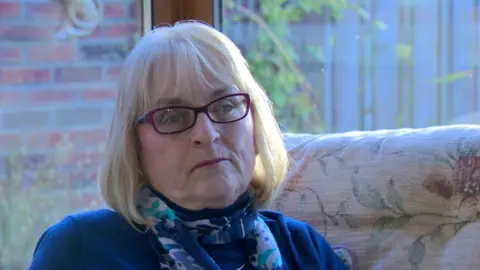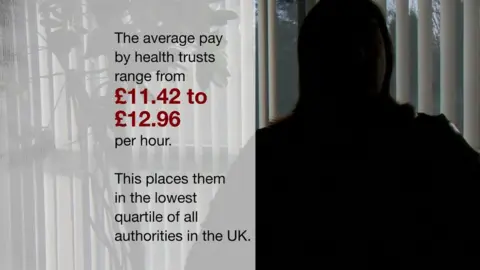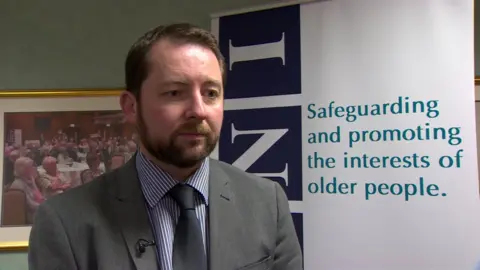Care workers 'exhausted' by staff shortage
A care worker in Northern Ireland has said she feels like a "workhorse" because a shortage of staff means she often has to work 80 hours a week.
Her comments follow a BBC investigation into the current state of social care.
It reveals that on one day this month, 88 people had to stay in hospital unnecessarily, due to a wait for a suitable home care package.
The Department of Health said care demand has risen "considerably" and it is reviewing its domiciliary workforce.
'Snapshot of situation'
The BBC's investigation also revealed that the longest wait for a patient for home care provision was 11 months.
However, the Southern Health Trust stressed that this was a highly unusual case where the patient required a specialist care package.
The second longest wait was in the Belfast Health Trust where a patient waited 104 days.

The average waiting time for a care package for people across the five health trusts during a three-month period ranges between three and 26 days.
These figures give a snapshot into Northern Ireland's adult social care system on just one day in the middle of November.
'Exhausted'
The home help worker, who wishes to remain anonymous, told the BBC that 37 house calls in 17 hours is not unusual.
"I feel like a workhorse at times," the interviewee said.
"You are physically and mentally exhausted because you are just working big hours all the time and even when you have given your last wee bit - they are still expecting you to go out and do a wee bit more - but that isn't recognised."

Domiciliary care is provided when a person who is living at home requires help with personal care, including practical household tasks.
It can involve helping the person wash, eat and take their medication.
A different care worker said that it was not unusual to work through a shift without taking any breaks for food or even to use the toilet.
"I was at work 17 hours and had seen 35 people - it was terrible," the woman said.
"The company was short staffed, the clients were back-to-back, I was constantly travelling between clients.
"I wasn't able to have a break - nothing to drink, eat or even a toilet break. That kind of day is pretty typical."
The workers' personal experiences highlight a social care system that is under considerable pressure due to the lack of domiciliary care staff across the five health trusts.
'Workforce gap'
A spokesperson for the Department said: "Demands on this vital service have grown considerably in recent years - not least in terms of the complexity of the needs being met.
"While clearly it is important that we respond to current needs, we must also look to the future and it is crucial that we develop new models of care to meet the challenges ahead."
They added that the department is finalising a domiciliary care workforce review and that initial findings demonstrate there is a gap in the workforce, resulting in pressure on services.

The review will set out a number of recommendations including commissioning, recruitment and career development and will contribute to the implementation of a health and social care workforce strategy which will be put to an incoming minister.
'Very frail'
The shortage is having a detrimental impact on staff, and it is also affecting patients and their families.
Moira Etherson, who is in her late 60s, is currently looking after her 97-year-old mother.

While a care package had been in place, with just a week's notice it was withdrawn by a private care company which told the family there was a shortage of staff.
That was four weeks ago.
"It's very, very tough. It is exhausting. My mother is very frail she needs a lot of help," Mrs Etherson said.
'Totally broken'
"My husband helps me to lift her but we haven't showered her in a month. We are just washing her, keeping her clean and comfortable."
Mrs Etherson, who lives in near Maghera, County Londonderry, described Northern Ireland's social care system as "totally broken".
"I think the health trust would need to take back responsibility for care within the community," she said.
"I think they have delegated it, it's got out of hand. For private companies, it's been a race to the bottom and I just feel that the staff have left because of their poor conditions, and clients like my mother have been abandoned."
In a statement, the Northern Health Trust confirmed that the independent company providing the 97 year old's care had withdrawn it last month and since then, the trust has been trying to secure a package of care to meet her needs.
It added that the difficulty in securing care packages "reflects the demands on the sector in some geographical areas" and the trust acknowledged the impact and distress on the family.
Pay rates
A national report on the funding of older people's homecare across the UK reveals that Northern Ireland pays the lowest rate per hour.
According to the Homecare Deficit 2016, the average prices paid by the individual health trusts ranged from £11.42 to £12.96 per hour, with trusts paying rates which places them in the lowest quartile of all authorities in the UK.
Matters such as pay might be addressed if a Northern Ireland government was in place.

The ongoing political vacuum means that a report into social care in Northern Ireland, completed in May 2017, remains unpublished.
'Exploited workers'
However, the Department of Health confirmed on Monday evening that it plans to publish it within the coming weeks.
The BBC understands that the report is critical of some aspects of the system, including that workers are being exploited.
Asked if people were suffering under the current care system, Chief Social Worker Sean Holland said that it was a "system under pressure".
"I think suffering is a very strong word. There are certainly people who on occasion have to wait a period of time for the care that they have been assessed as needing," he said.
"But we are providing care to approximately 24,000 people and I think we shouldn't lose sight of the fact that if we were to go a generation back, many of those people would have to live in institutions or end their days in long stay hospital wards."
'Very concerning'
Meanwhile, none of the recommendations - included in a separate report entitled 'Domiciliary Care in Northern Ireland' by the Commissioner for Older People in 2015 - have been implemented.
The current commissioner, Eddie Lynch, said: "I would describe the situation with domiciliary care as very serious across Northern Ireland.

"Many older people are not getting their needs looked after. They are getting them assessed, but then the care packages aren't being implemented for a series of reasons and this is very concerning.
He added: "In particular, two years on from when a report was published from my office which outlined clear recommendations to government about what needs to happen, that report has yet to be implemented.
"So, older people across Northern Ireland are still in situation where they are not getting the care they deserve at home."
